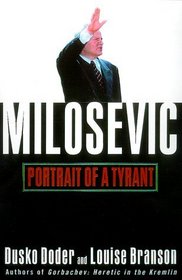Search -
Milosevic : Portrait of a Tyrant
Milosevic Portrait of a Tyrant
Author:
Who is Slobodan Milosevic? Is he the next Saddam Hussein, the leader of a renegade nation who will continue to torment the United States for years to come? Or is he the next Moammar Qaddafi, an international outcast silenced for good by a resolute American bombing campaign? The war in Kosovo in the spring of 1999 introduced many Americans to t... more »
Author:
Who is Slobodan Milosevic? Is he the next Saddam Hussein, the leader of a renegade nation who will continue to torment the United States for years to come? Or is he the next Moammar Qaddafi, an international outcast silenced for good by a resolute American bombing campaign? The war in Kosovo in the spring of 1999 introduced many Americans to t... more »
ISBN-13: 9780684843087
ISBN-10: 0684843080
Publication Date: 11/12/1999
Pages: 320
Rating: ?
ISBN-10: 0684843080
Publication Date: 11/12/1999
Pages: 320
Rating: ?
0 stars, based on 0 rating
Genres:
- Biographies & Memoirs >> General
- Biographies & Memoirs >> Leaders & Notable People >> Political
- History >> Europe >> Eastern
- History >> Europe >> Serbia
- History >> Europe >> Yugoslavia
- Nonfiction >> Current Events >> War & Peace




